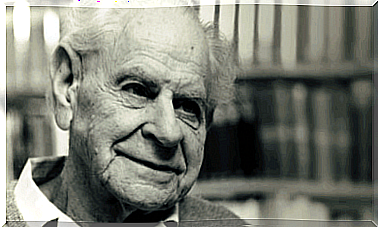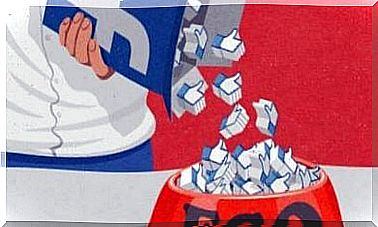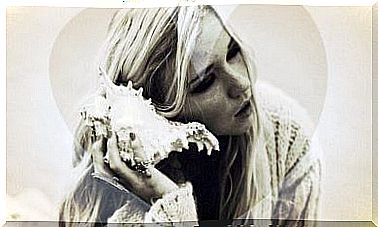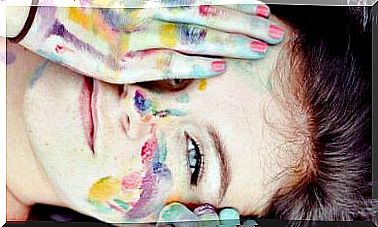Major Depression: What Is The Cause And How To Treat It?

When we talk about depression, for all of us, quickly, a series of images comes to mind in which we visualize someone with a sad expression, crying disconsolately and isolated from other people. But then what is the difference between major depression and deep sadness?
It is a big mistake to confuse the two concepts since, although they are closely related, they are part of a sequence where major depression is the farthest and most disabling extreme. An extreme where the suffering person finds himself in a dark, crooked and hopeless underworld.
We know that emotions have a great adaptive role and that, whether positive or negative, they are all necessary for the correct functioning within our environment. Sadness, therefore, although it belongs to the category of “negative emotion”, is still a healthy and adaptive emotion, thanks to which, in part, we managed to survive.
If, for example, we lose a loved one, sadness will inevitably blossom in us and lead us to a state of mourning where the healthy thing will be to go through some or all of the phases that usually make it up. The idea is, once finalized, to return to the state before the loss, except that we will always remember with affection and nostalgia this being that was part of our life.
In this sense, the feeling of sadness is healthy, necessary and useful. So, the most logical thing is for any of us to experience it in situations like or similar to the ones we mentioned. Therefore, when sadness invades us, the wisest thing is to live it, not deny it, nor fight against it, until little by little it disappears.
What Causes Major Depression?
As we mentioned, major depression involves going many steps beyond sadness. It is classified as a disorder and, therefore, it must be treated with the seriousness and respect that it means. Before explaining the possible causes, let’s define what the disorder consists of.
Major depression is defined by the simultaneous presence of a series of important symptoms, and its presence should last for two weeks. For your diagnosis, at least one of these symptoms must be a sad, depressed mood, or a loss of pleasure (anhedonia) with the activities you used to enjoy.

On the other hand, the diagnosis of major depression requires meeting additional exclusion criteria : that the symptoms are not caused by an illness or the ingestion of any substance; that the symptoms are not the result of a normal grief reaction to the death of a loved one. There is a subtype, called melancholic, in which a series of symptoms appear, such as a severe loss of pleasure, lack of emotional reaction or psychomotor inhibition.
In addition, to diagnose major depressive disorder, the person must not have had any episodes of mania or hypomania or be a case of schizophrenia or other psychotic disorder.
At a biological level, chemical imbalances in the brain, especially all of the well-known neurotransmitter serotonin, would be responsible for the person entering this state of accentuated sadness and anhedonia. Currently, it is not known on scientific basis whether these biochemical imbalances are a cause or a consequence of depression, so we cannot conclude that low levels of serotonin in the brain are responsible for a person becoming depressed.
On the other hand, there are theories with a more psychological profile: currently the most grounded ones. The best known theory is that of Aaron Beck. Its popularity is based on facts: it is a theory that fully embraces theoretical assumptions and information processing methodology; second, it gave rise to a type of treatment – cognitive therapy – which has been shown to be equally effective or more effective than pharmacological therapy, with the added benefit of further reducing the risk of relapses and side effects.
What does Beck’s Theory of Depression say?
For Beck, after the loss of the award (positive consequence of the behavior) and the subsequent natural emotion of sadness, a series of cognitive errors will appear in the person: failures in the processing of external information, which would be responsible for the disorder appearing and remaining throughout of time. Let us suppose that the depressed person is not able to be objective when it comes to perceiving the information that surrounds him and that, therefore, he distorts reality in a negative way.
Some of these distortions that happen more often in depressed people are, for example, the magnification of the negative facts that happen in their life, the minimization of the positive facts that occur, the exaggeration of the consequences of such negative facts and the overgeneralization or thinking that always it will be like that and nothing will change.

It is this distorted cognitive processing that would lead, according to the author, to affective symptoms – deep sadness, lack of appetite, feelings of emptiness… – and the behavioral ones – inhibition, neglect… These affective and behavioral symptoms, in turn, will reinforce negative thoughts, causing them to consolidate and perpetuate the disorder.
However, Beck does not rule out the fact that genetic, personal, hormonal, etc. factors are also involved in this type of processing.
What treatments are there for major depression?
In general terms, we can define a clear difference between pharmacological treatments, which are responsible for reestablishing the biochemical cerebral imbalance we spoke about earlier, and psychological treatments, those aimed at improving the patient’s state of mind, as well as his existential functioning. Depending on the case being treated, mental health professionals choose to use one or the other, or both in combination.
Within pharmacological treatment, the most used drugs are the so-called selective serotonin reuptake inhibitors (SSRIs). They are used more often because they have fewer side effects than tricyclic antidepressants or Monoamine Oxidase Inhibitors (MAMOS). Everyone has heard of Prozac (fluoxetine), which is part of this group.
What is intended with these drugs, as their name indicates, is to prevent serotonin from being reabsorbed quickly and, therefore, that its effect in the brain is not lost so quickly when it is released in the small space that exists between neurons. The drug would act as a first impulse that would make the patient feel more excited to take action.

On the other hand, within the psychological treatments, those that proved to be more efficient are those that are incorporated into the cognitive-behavioral stream. Assuming that the cause of depression is that the patient has a distorted perception, towards the negative pole, of their own reality and that, as a result, they feel and act, the objective of this treatment will be for the person to change this cognitive orientation.
Following this logic, therapy is aimed at modifying the patient’s way of thinking, providing him with tools to identify and modify such tendencies. Then, thanks to a change in his way of thinking, the patient will begin to carry out the activities that he has been putting aside and that used to give him pleasure, as well as incorporating new ones that can benefit him and please him.
We change the conduct
In this sense, we don’t have to start by modifying the patient’s thoughts and beliefs, but we can start directly with behavioral activation. If this option is chosen, the patient will be able to draw up a daily plan in which different tasks that the patient undertakes to fulfill will be incorporated.
The weekly plan needs to include both mastering and pleasing tasks. Mastery tasks are those that will help the patient to feel competent and not see himself as a failure or useless. An example might be resuming or starting to take English classes. Pleasant tasks are those that involve leisure and pleasure, such as going shopping, taking a walk, calling a friend, etc.
What usually happens is that the depressed person will say that they don’t feel motivated to do any task, that they don’t make sense, that they don’t believe it’s their problem or that they don’t have the energy or the will. It is common for you to have a drawer full of excuses for not fulfilling these tasks. As therapists, we need to know that this attitude and these excuses are part of the disorder and make them see that they need to fight this inertia.
We modify the cognitions
The cognitive techniques we use to modify negative thoughts and beliefs will be cognitive restructuring and behavioral experiences. Through restructuring, the intention is for the person to change their negative way of thinking towards a more adapted – not positive – view of reality and to realize that they are able to withstand it and, in addition, it is not so terrible how you think.
On the other hand, behavioral experiences will help the patient to realize how distorted some of his thoughts are. The therapist will propose to the patient to carry out an activity or action. The therapist needs to write down what he believes will happen to him and, once done, in the next session, therapist and patient will analyze what really happened.

Finally, and depending on the patient, other more emotional techniques can be used, such as emotional rational imagination – seeing yourself performing an activity and modifying your emotions in imagination – mindfulness – focusing on the here and now, without letting attention moving and fully accepting the surrounding reality – assertiveness training or problem solving training.
References:
Ortiz-Tallo, M (2004).
…
Edaf.









